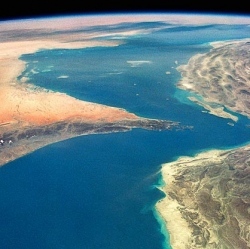
The researchers behind Rosetta, the ESA spacecraft currently orbiting the Churyumov-Gerasimenko comet, think they can help answer one of the fundamental questions about how water came to Earth: most likely not from comets. They published their findings today in Science.
Around 4 billion years ago, meteorites repeatedly slammed into the young Earth in a violent event called the Late Heavy Bombardment. This happened right after our planet’s crust had started to cool, so instead of burning up and disintegrating into the molten surface of an older Earth, these chunks of comets and asteroids made landfall. In the process they likely brought the first organic molecules to Earth and maybe even enough water to form oceans, setting the scene for life to take hold.
Since the average asteroid and comet are much older than most of Earth’s crust today by several billion years, scientists have been chasing them down to better understand the conditions under which life on Earth may have started. In the eight analyses of comets that scientists have done so far, water has been a central question; instruments both near and far to the comet can detect the concentrations of certain elements in comet ice to see if they match what we see on Earth. But with data from only a few comets, not all planetary scientists are convinced that the answer is quite so simple.
Although the Rosetta orbiter is not the first to do close analysis of ice on a comet, Kathrin Altwegg, the principal investigator of the mass spectrometer on the Rosetta craft, an astronomer at the University of Bern in Switzerland and one of the study authors, says this data is a surprising addition to the information we already know.
"When we launched this mission 10 years ago, I wouldn’t have been surprised at all about the findings," she says. But then, three years ago, a mission to the comet Hartley–2 three years ago yielded very different results, suggesting that Earth’s water may have been deposited by comets. Rosetta’s findings don’t support that conclusion. "Not everything is as simple as it seems, we have real science here," she says.
The scientists are addressing the dispute about water’s origin by looking at hydrogen isotopes, molecules that all have the same number of protons and electrons but different numbers of neutrons in their nuclei. They’re still hydrogen, but one isotope dubbed deuterium has one more neutron, which means it’s heavier than regular hydrogen. Both hydrogen and deuterium are found in water and ice. The unique ratio of hydrogen to deuterium can help identify where in the solar system the water came from.
The Earth has a pretty small ratio, only three heavy molecules out of 10,000, Altwegg says, but it’s a ratio that is characteristic of our planet. Because Rosetta was so close to the comet, scientists were able to use a technique called mass spectrometry to determine the quantity and type of chemicals present in a sample. It’s also possible to detect the ratio in comets that are farther away; to do so, scientists have used remote observations based on the light waves coming from the sample.
